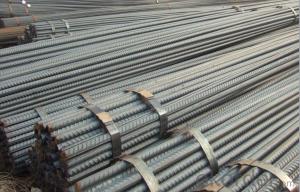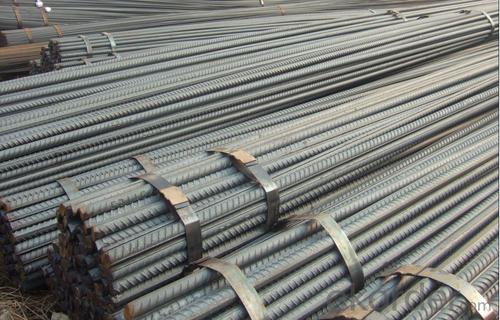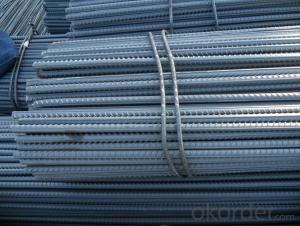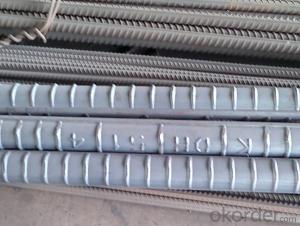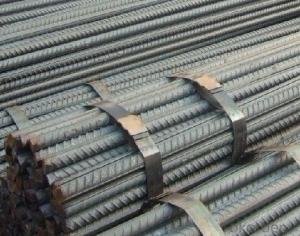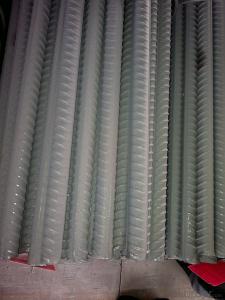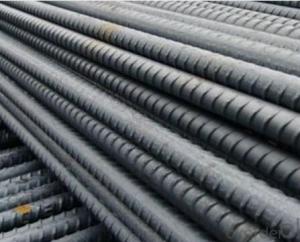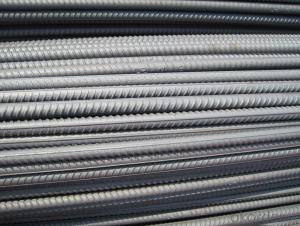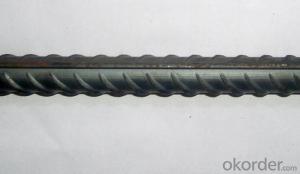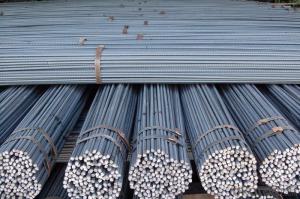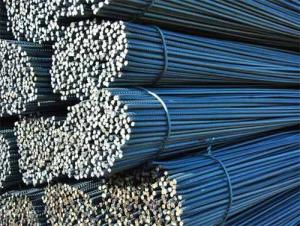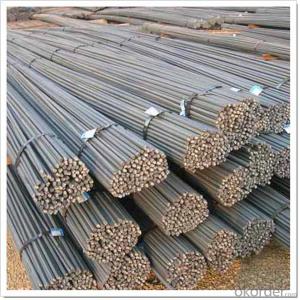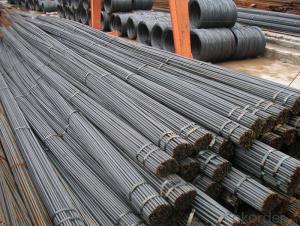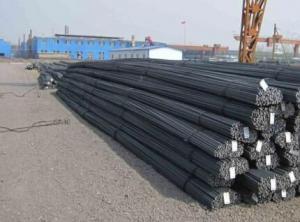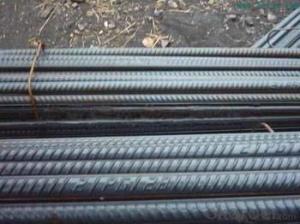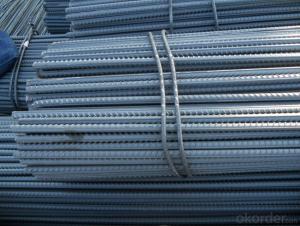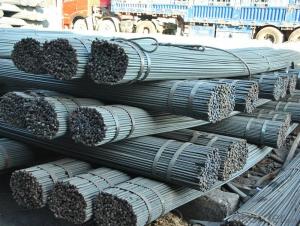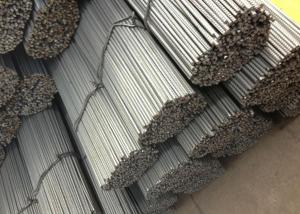Hot Rolled Carbon Steel Rebar 12mm with High Quality
- Loading Port:
- China Main Port
- Payment Terms:
- TT or LC
- Min Order Qty:
- 25 m.t.
- Supply Capability:
- 10000 m.t./month
OKorder Service Pledge
OKorder Financial Service
You Might Also Like
Product Description:
OKorder is offering Hot Rolled Carbon Steel Rebar 12mm with High Quality at great prices with worldwide shipping. Our supplier is a world-class manufacturer of steel, with our products utilized the world over. OKorder annually supplies products to European, North American and Asian markets. We provide quotations within 24 hours of receiving an inquiry and guarantee competitive prices.
Product Applications:
Hot Rolled Carbon Steel Rebar 12mm with High Quality is widely used in buildings, bridges, roads and other engineering construction. Big to highways, railways, bridges, culverts, tunnels, public facilities such as flood control, dam, small to housing construction, beam, column, wall and the foundation of the plate, deformed bar is an integral structure material. With the development of world economy and the vigorous development of infrastructure construction, real estate, the demand for deformed bar will be larger and larger..
Product Advantages:
OKorder's Hot Rolled Carbon Steel Rebar 12mm with High Quality are durable, strong.packed and suitable for construction
Main Product Features:
· Premium quality
· Prompt delivery & seaworthy packing (30 days after receiving deposit)
· Can be recycled and reused
· Mill test certification
· Professional Service
· Competitive pricing
Product Specifications:
Manufacture: Hot rolled
Grade: HRB335 HRB400 BS4449 Grade460 ASTM Grade40 Grade60
Certificates: ISO, SGS, BV, CIQ
Length:6m 8m 9m 12m
Packaging: Export packing, packed by coil
FAQ:
Q1: Why buy Materials & Equipment from OKorder.com?
A1: All products offered byOKorder.com are carefully selected from China's most reliable manufacturing enterprises. Through its ISO certifications, OKorder.com adheres to the highest standards and a commitment to supply chain safety and customer satisfaction.
Q2: How do we guarantee the quality of our products?
A2: We have established an advanced quality management system which conducts strict quality tests at every step, from raw materials to the final product. At the same time, we provide extensive follow-up service assurances as required.
Q3: How soon can we receive the product after purchase?
A3: Within three days of placing an order, we will begin production. The specific shipping date is dependent upon international and government factors, but is typically 7 to 10 workdays.
Q4: Can you supply the Rebar according to the standard KS?
A4: Yes, we can supply SD400 and SD500
Q5: How to avoid the rust after deliver the goods to the loading port?
A5: We will keep the goods at the port covered with water-proof material
Q6: What is the chemical composition and physical properties of HRB400?
A6:
Grade | Technical data of the original chemical composition (%) | ||||||
C | Mn | Si | S | P | V | ||
HRB400 | ≤0.25 | ≤1.60 | ≤0.80 | ≤0.045 | ≤0.045 | 0.04-0.12 | |
Physical capability | |||||||
Yield Strength (N/cm²) | Tensile Strength (N/cm²) | Elongation (%) | |||||
≥400 | ≥570 | ≥14 | |||||
Images:
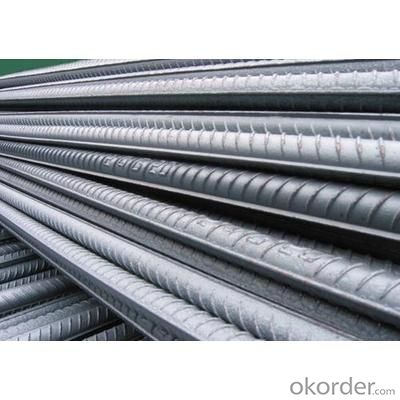
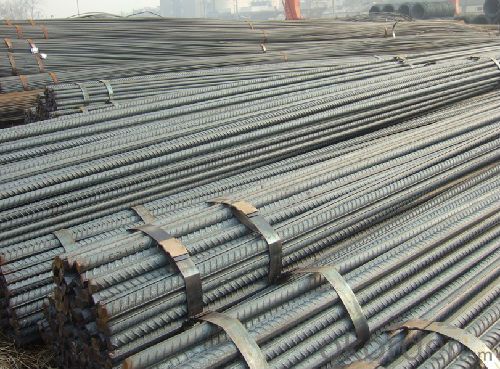
- Q: Are steel rebars suitable for reinforcement in parking garages?
- Yes, steel rebars are suitable for reinforcement in parking garages. They are commonly used due to their high tensile strength, durability, and ability to withstand heavy loads. Additionally, steel rebars provide structural stability and help prevent cracking or collapsing of the concrete in parking garages, making them an ideal choice for reinforcement.
- Q: Can steel rebars be used in retrofitting existing structures?
- Yes, steel rebars can be used in retrofitting existing structures. Retrofitting involves strengthening or upgrading the structural components of a building to improve its performance and safety. Steel rebars are commonly used in this process as they provide added strength and reinforcement to the existing structure, helping it withstand increased loads or seismic forces.
- Q: Excuse me, Shagang steel steel, what is the sign of
- Steel is known as hot rolled ribbed bar. Ordinary hot rolled steel bars are made up of HRB and the minimum yield point of the brand. H, R, and B are the first letters in English for hot-rolled (Hotrolled), ribbed (Ribbed) and reinforced (Bars) three words. Hot rolled ribbed bar is divided into two levels, HRB335 (old No. 20MnSi), three HRB400 (20MnSiV, 20MnSiNb, old No. 20Mnti), four grade HRB500 three grade
- Q: What is the typical weight per meter of a steel rebar?
- The typical weight per meter of a steel rebar can vary depending on the diameter and thickness of the rebar. However, on average, a steel rebar weighs around 0.75 kilograms per meter.
- Q: Can steel rebars be used in pedestrian bridge construction?
- Yes, steel rebars can be used in pedestrian bridge construction. Steel rebars provide strength and durability to the bridge structure, making them a commonly used material for reinforcing concrete in bridge construction projects.
- Q: Do steel rebars have any specific markings or codes?
- Yes, steel rebars typically have specific markings or codes to indicate their size, type, and grade. These markings are essential for identifying and ensuring the correct usage of rebars in construction projects.
- Q: Are there any standards or codes for steel rebars?
- Certainly, steel rebars are subject to standards and codes that are essential for guaranteeing their quality, safety, and compatibility across various construction projects. One of the most widely recognized standards for steel rebars is the ASTM A615/A615M, which is responsible for specifying the requirements of deformed and plain carbon-steel bars used in concrete reinforcement. This standard covers a range of physical and mechanical properties, including chemical composition, yield strength, tensile strength, elongation, and bendability. It also provides guidelines for marking, packaging, and testing of rebars. In addition to the ASTM A615/A615M, there are other relevant standards and codes utilized in different countries and regions. For instance, in Europe, the European Standard EN 10080 outlines the specifications for steel rebars, including dimensions, tolerances, and mechanical properties. Similarly, the British Standard BS 4449 is widely employed in the United Kingdom for steel reinforcement in concrete. These standards and codes play a pivotal role not only in ensuring consistency during the manufacturing and production of steel rebars but also in aiding architects, engineers, and construction professionals in selecting the most suitable rebars for their projects. Compliance with these standards is of utmost importance to ensure the structural integrity, durability, and safety of reinforced concrete structures. It is imperative for stakeholders in the construction industry to acquaint themselves with the pertinent standards and codes for steel rebars and consistently adhere to them. This practice helps to uphold high-quality construction protocols and mitigate the risk of failures or accidents caused by substandard materials.
- Q: What are the different grades of steel rebars available?
- In the market, there are various grades of steel rebars available, each with its own specific characteristics and applications. The commonly used grades are as follows: 1. Grade 40: This rebar has low strength and is suitable for general construction purposes where high tensile strength is not necessary. It is commonly utilized in residential buildings, sidewalks, and driveways. 2. Grade 60: Offering higher tensile strength than Grade 40, this rebar is of medium strength. It finds wide usage in commercial buildings, bridges, and infrastructure projects. Grade 60 rebar provides excellent reinforcement for heavy loads and ensures structural stability. 3. Grade 75: With exceptional tensile strength, this rebar is of high strength and is often employed in challenging construction projects. It is commonly used in high-rise buildings, parking garages, and industrial structures to ensure superior reinforcement and structural integrity. 4. Grade 80 and higher: These rebars are designed for specialized applications where extreme load-bearing capacity is required. They are commonly used in heavy-duty infrastructure projects, such as dams, tunnels, and nuclear power plants, where the demand for strength is significantly greater. The selection of the grade of steel rebar depends on factors such as the specific construction project, load-bearing requirements, and environmental conditions. Engineers and architects assess these factors to determine the most suitable grade of steel rebar for a particular application, ensuring optimal performance and structural durability.
- Q: How do steel rebars prevent the concrete from cracking under tension?
- Steel rebars reinforce concrete and increase its structural integrity, preventing cracking under tension. Concrete has low tensile strength and tends to crack when subjected to tensile forces. However, when steel rebars are embedded in the concrete, they absorb and distribute these forces, acting as reinforcement. Typically made of high-strength steel, the rebars have a much higher tensile strength compared to concrete. As a result, when the concrete is under tension, the rebars bear most of the load, preventing cracking. The rebars act as a framework or skeleton within the concrete, resisting the tensile forces and ensuring its structural stability. Furthermore, the bond between the steel rebar and the concrete also plays a role in preventing cracking under tension. The ribbed or deformed surface of the rebars enhances the bond with the surrounding concrete, creating a strong connection. This bond allows the rebars to transfer the tensile forces to the concrete matrix more effectively, reducing the risk of cracking. By reinforcing the concrete, steel rebars help distribute the tensile forces evenly throughout the structure. This prevents localized stress concentrations and minimizes the chances of cracks forming. Additionally, if cracks do occur, the presence of rebars can help control their propagation by acting as barriers that restrict further spread. In conclusion, steel rebars provide reinforcement, increase the strength of concrete, and prevent cracking under tension. They bear the tensile forces, distribute them evenly, and enhance the bond between the rebar and the concrete. This reinforcement ensures the structural integrity of the concrete and helps prevent cracking.
- Q: Are steel rebars suitable for use in high-traffic areas like bridges?
- Yes, steel rebars are suitable for use in high-traffic areas like bridges. Steel rebars provide exceptional strength and durability, making them ideal for withstanding heavy loads and frequent use. Additionally, steel rebars offer excellent resistance to corrosion, ensuring the longevity and structural integrity of bridges in high-traffic areas.
Send your message to us
Hot Rolled Carbon Steel Rebar 12mm with High Quality
- Loading Port:
- China Main Port
- Payment Terms:
- TT or LC
- Min Order Qty:
- 25 m.t.
- Supply Capability:
- 10000 m.t./month
OKorder Service Pledge
OKorder Financial Service
Similar products
Hot products
Hot Searches
Related keywords
